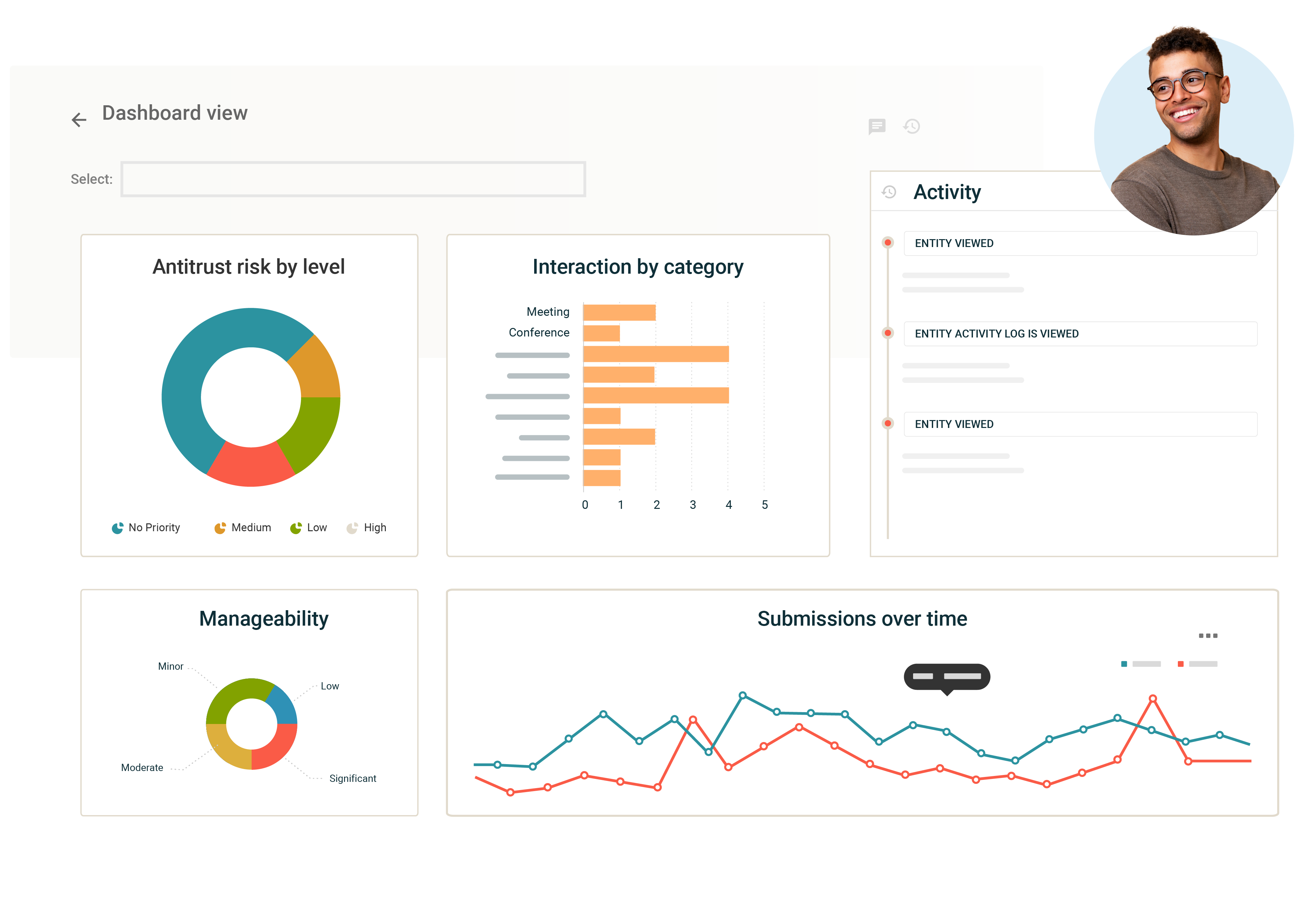Consumer Goods
Compliance Solutions for the Consumer Goods Industry
Benefit from a unified, data-driven approach to managing corporate compliance, ethics and third-party risk, trusted by leading consumer goods companies.

Trusted by the world’s leading consumer goods companies
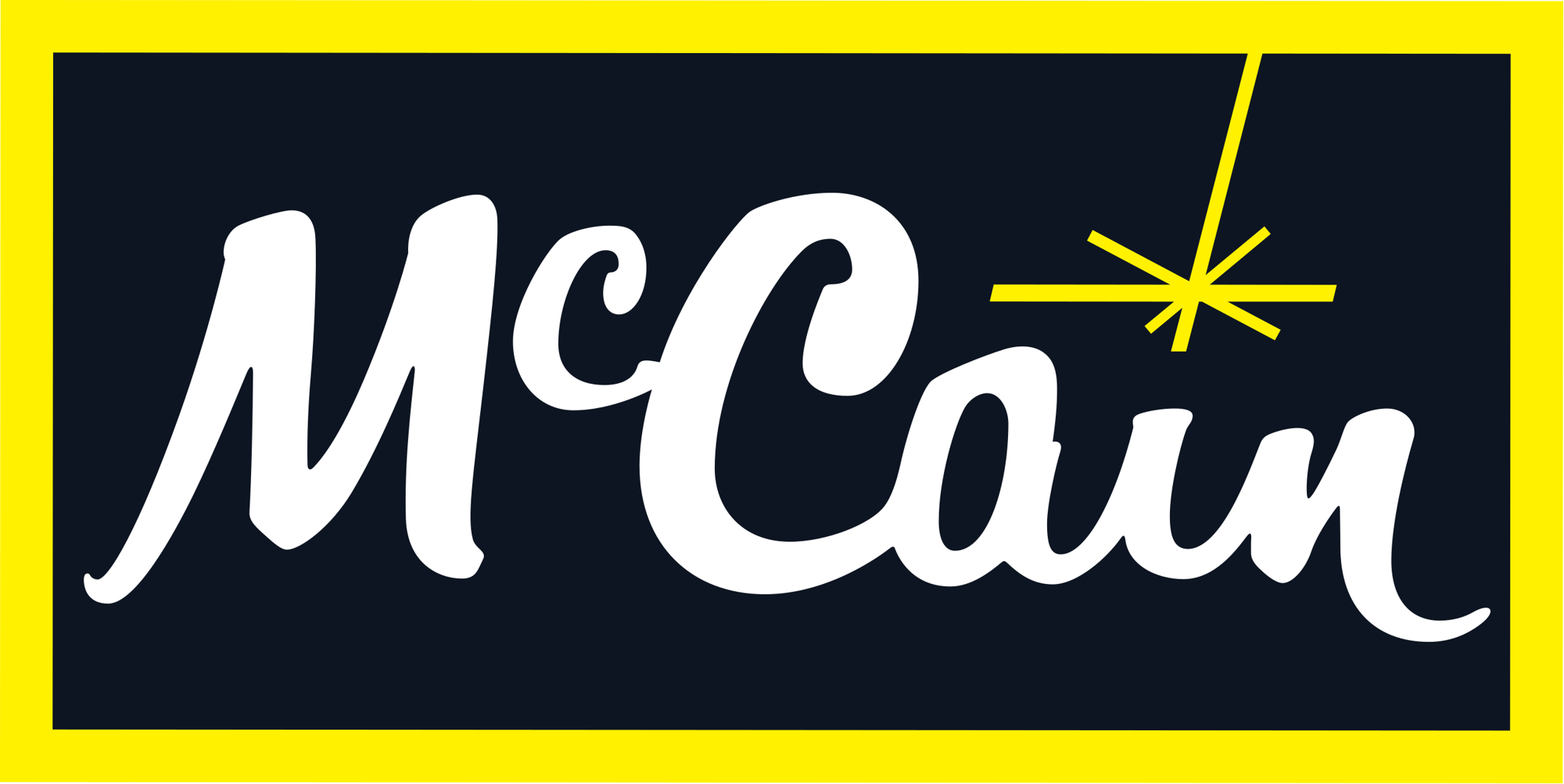



Why leading consumer goods companies rely on GAN Integrity
GAN Integrity is how compliance teams at consumer goods companies get the tools and expertise to stay ahead of risk. With less effort and more reach, you finally get a better way to do your good work.
See everything – Gain a comprehensive view of regulatory risk and compliance in one centralized, easy-to-use platform.
Adapt to anything – Tailor the platform to your organization, regardless of your tech stack, regions, risk appetite, and other complexities -all without heavy lifting or expense.
Get all the help you need – Receive dedicated support from GAN Integrity’s team of experts.
Compliance challenges for the consumer goods industry

As a compliance professional in the consumer goods industry, you may feel like you're fighting an unfair fight. You must ensure your company operates in compliance with a wide array of regulations, standards, and guidelines established by regulatory authorities, industry groups, and international bodies. These typically span multiple jurisdictions and involve managing a broad range of risk types.
Whether you’re in durable or non-durable goods, regulations such as the Food Safety Modernization Act (FSMA), EU’s General Product Safety Directive (GPSD), and new regulations such as the German Supply Chain Act (LKsG) and Corporate Sustainability Due Diligence Directive (CSDDD) add to the demands on you and your team, extending risk and compliance obligations beyond the enterprise to include third parties and suppliers.
Key areas of compliance in consumer goods
Consumer goods companies are complex enterprises. There’s many areas of compliance, ethics, and risk that need to be managed, spanning everything from Environmental, Social and Governance (ESG), to Anti-Bribery And Corruption (ABAC). These include:
- Supply Chain Due Diligence: Ensuring reliability, traceability, and compliance with laws such as the German Supply Chain Act, CSDDD, and the California Transparency in Supply Chain Act.
- ABAC Compliance: Ensuring that anti-bribery and anti-corruption (ABAC) laws and standards are upheld.
- Product Safety: Ensuring consumer protection from hazards across multiple product categories and meeting obligations in regulations such as the EU's GPSD.
- Data Protection: Safeguarding sensitive information in an increasingly digital landscape and ensuring compliance with data privacy regulations including GDPR and CCPA (California Consumer Privacy Act).
- Environmental Compliance and Sustainability: Growing focus on environmental impact pushes regulations towards sustainable packaging, sourcing, and production methods.
- Emerging Technologies and Innovation: Navigating the legal and ethical considerations surrounding the development and implementation of emerging technologies such as AI.
- Workplace Safety: Implementing standards for a safe working environment.
- Labor Laws: Observing fair employment practices and labor standards, global modern slavery, and human rights legislation.
Steps to achieving compliance in the consumer goods industry
Achieving compliance in any organization involves a series of strategic steps:
Compliance in the Consumer Goods Industry
Risk Assessment
Identify potential compliance risks specific to your consumer goods operations.
Objective Setting
Define clear compliance goals that align with your operational objectives.
Documentation
Maintain thorough records of compliance efforts and decisions.
Training
Educate employees about compliance requirements tailored to the consumer goods industry.
Monitoring and Auditing
Regularly review compliance status and adjust practices as needed.
Reporting System
Establish clear channels for reporting issues and disclosures.
Issue Response
Quickly address non-compliance issues to prevent disruptions.
Continuous Improvement
Regularly update compliance practices to stay ahead of regulatory changes.
GAN Integrity for Consumer Goods Companies
GAN Integrity helps consumer goods companies navigate these challenges with a unified, easy-to-use compliance platform that organizes requirements, automates tasks, and provides powerful reporting, making it easier for you to do your good work. With GAN Integrity, compliance teams can see everything, adapt to anything, and get all the help they need.
ABAC Program Management
Ensure your organization upholds ethical integrity and ABAC compliance through comprehensive risk assessments, effective policy management, and continuous monitoring. Capabilities include:
- Third-party due diligence: Mitigate bribery and corruption risks with integrated questionnaires, sanctions checks, and risk intelligence data.
- Disclosure management: Consolidate and assess conflicts of interest, gifts, travel, entertainment, and political and charitable contribution disclosures.
- Reporting and documentation: Maintain a complete audit trail and detailed reporting to easily demonstrate compliance to stakeholders and regulators.
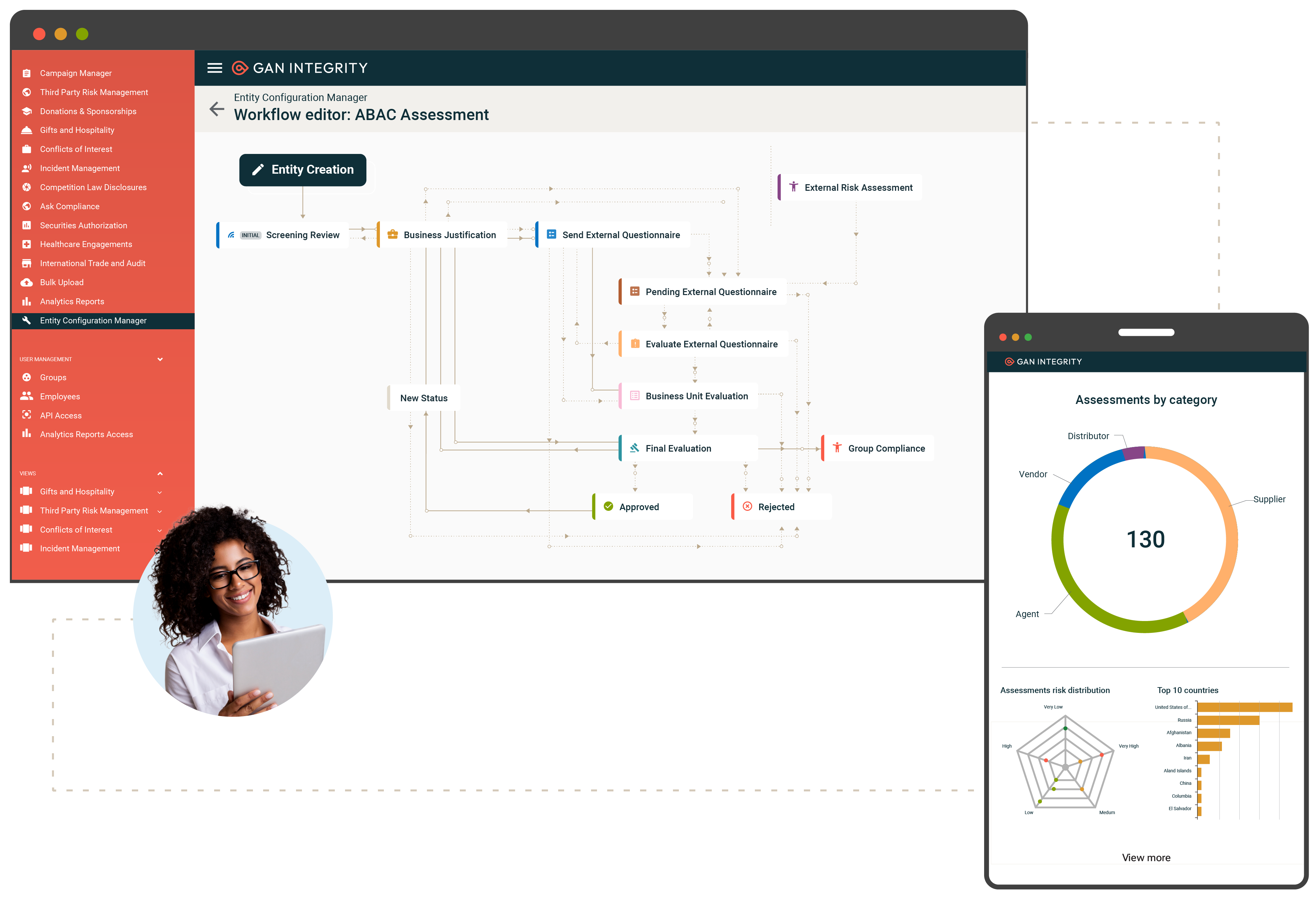
Gifts and Entertainment
Manage gifts and entertainment disclosures with an easy to use, configurable platform. Capabilities include:
- Flexible Processes: Adapt disclosure intake forms and workflows to your business processes.
- Campaign management: Set up campaigns to inform and engage employees in your disclosure program.
- Third-party risk integration: Track gifts and entertainment disclosures against third parties and suppliers for a holistic view of risk.
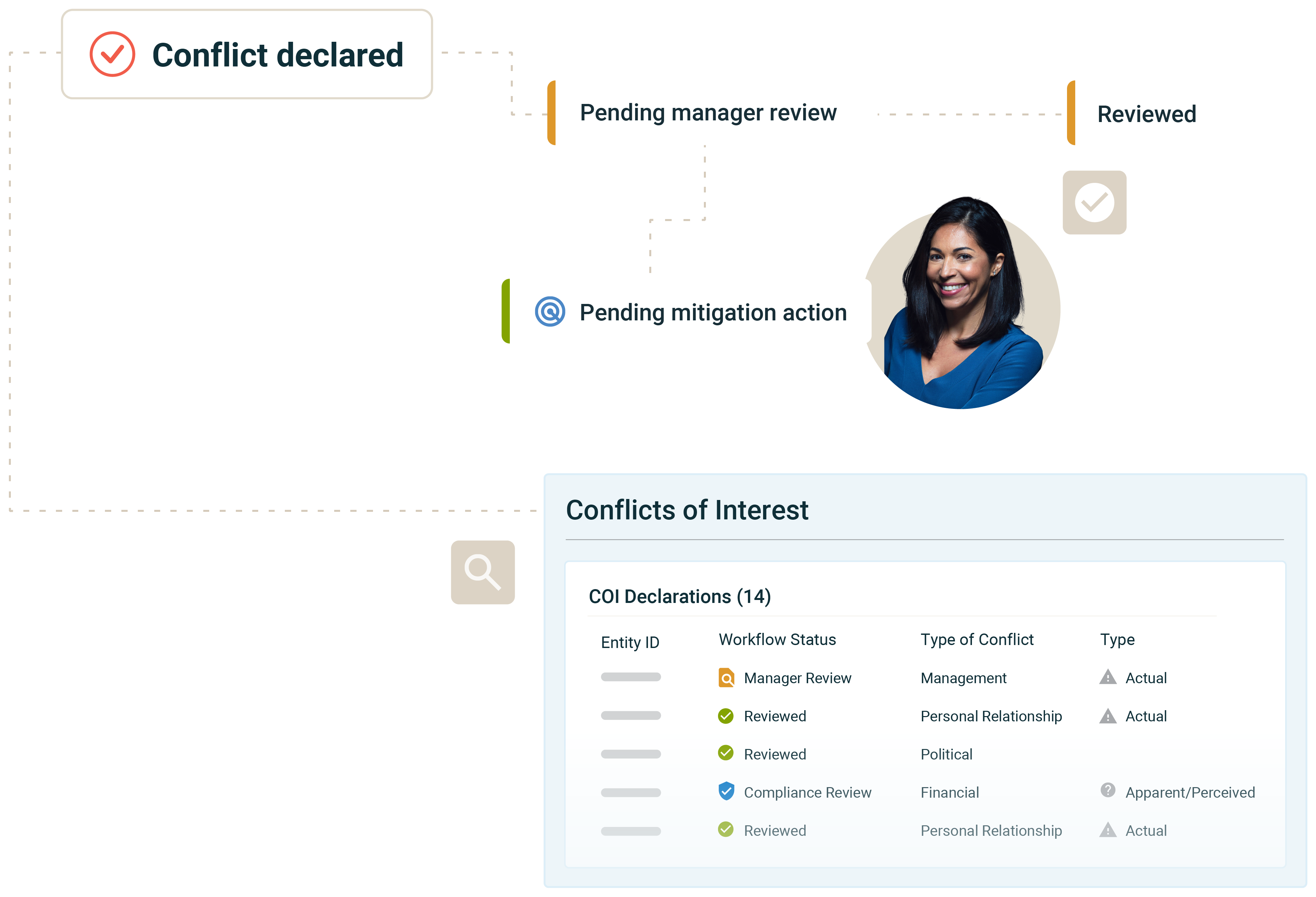
Supply Chain Due Diligence
Enhance supply chain risk management by consolidating processes, identifying and mitigating risks, and integrating data from various risk intelligence and business systems. Capabilities include:
- Automated risk assessments and continuous monitoring: Monitor suppliers continuously for adverse media, sanctions lists, PEP lists, forced labor, and ESG (Environmental, Social, and Governance) issues.
- High-risk supplier identification and management: Identify high-risk suppliers, manage them effectively, and track actions and mitigations to ensure compliance.
- Integrated due diligence assessments: Perform thorough due diligence across your business operations and workflows for seamless integration and enhanced efficiency.
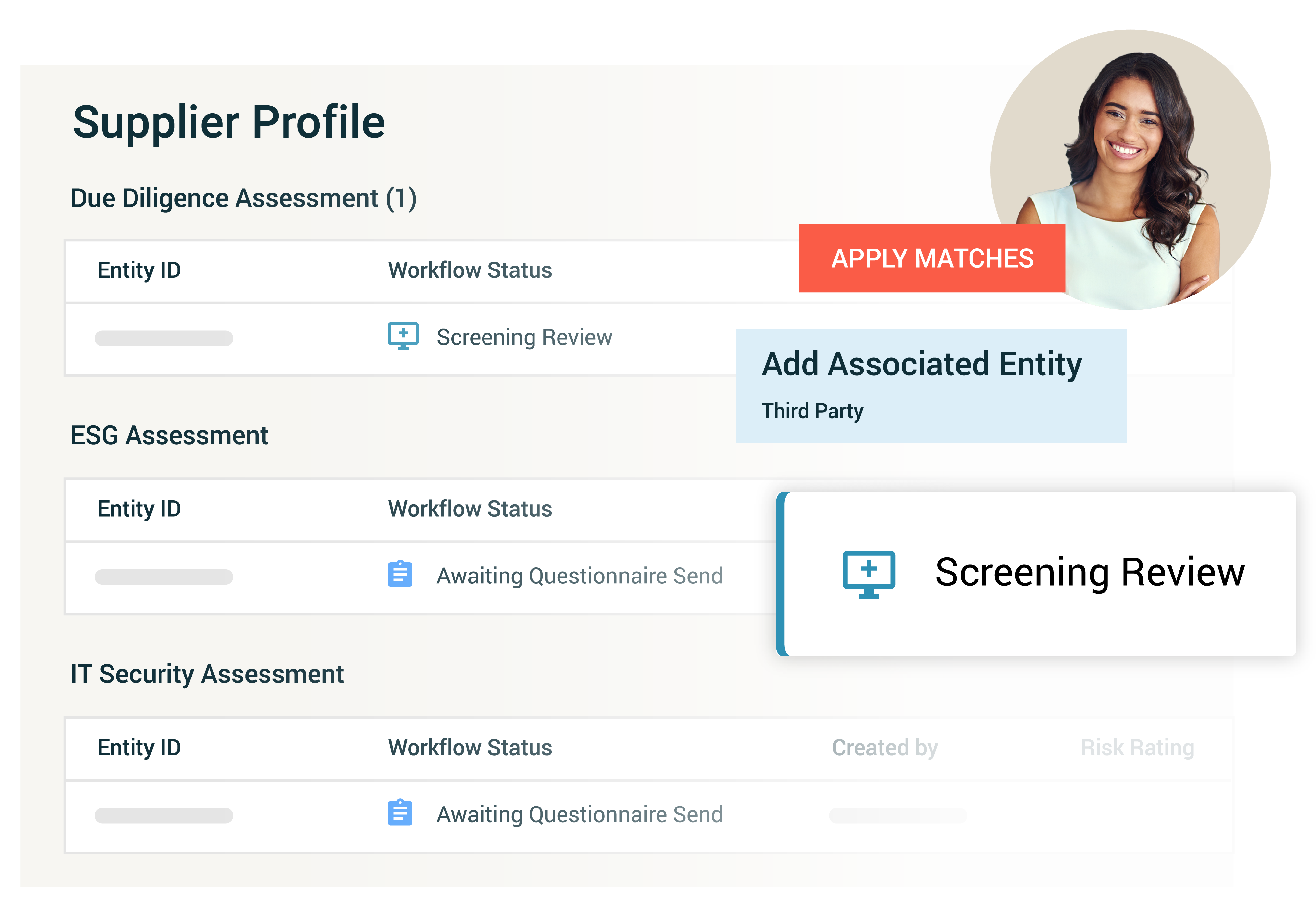
Disclosure Management
Consolidate your disclosures for conflicts of interest (COI), gifts, travel, entertainment, and political and charitable donations or contributions. Capabilities include:
- Policy management: Develop and enforce comprehensive disclosure policies. Educate and engage your workforce with targeted training and policy attestations.
- Flexible disclosure process: Simplify the submission of potential conflicts of interest with user-friendly forms, ensuring easy access for employees.
- Automated approvals and reviews: Enhance compliance with automated approval and review workflows. Quickly escalate notifications to relevant stakeholders to address potential risks.
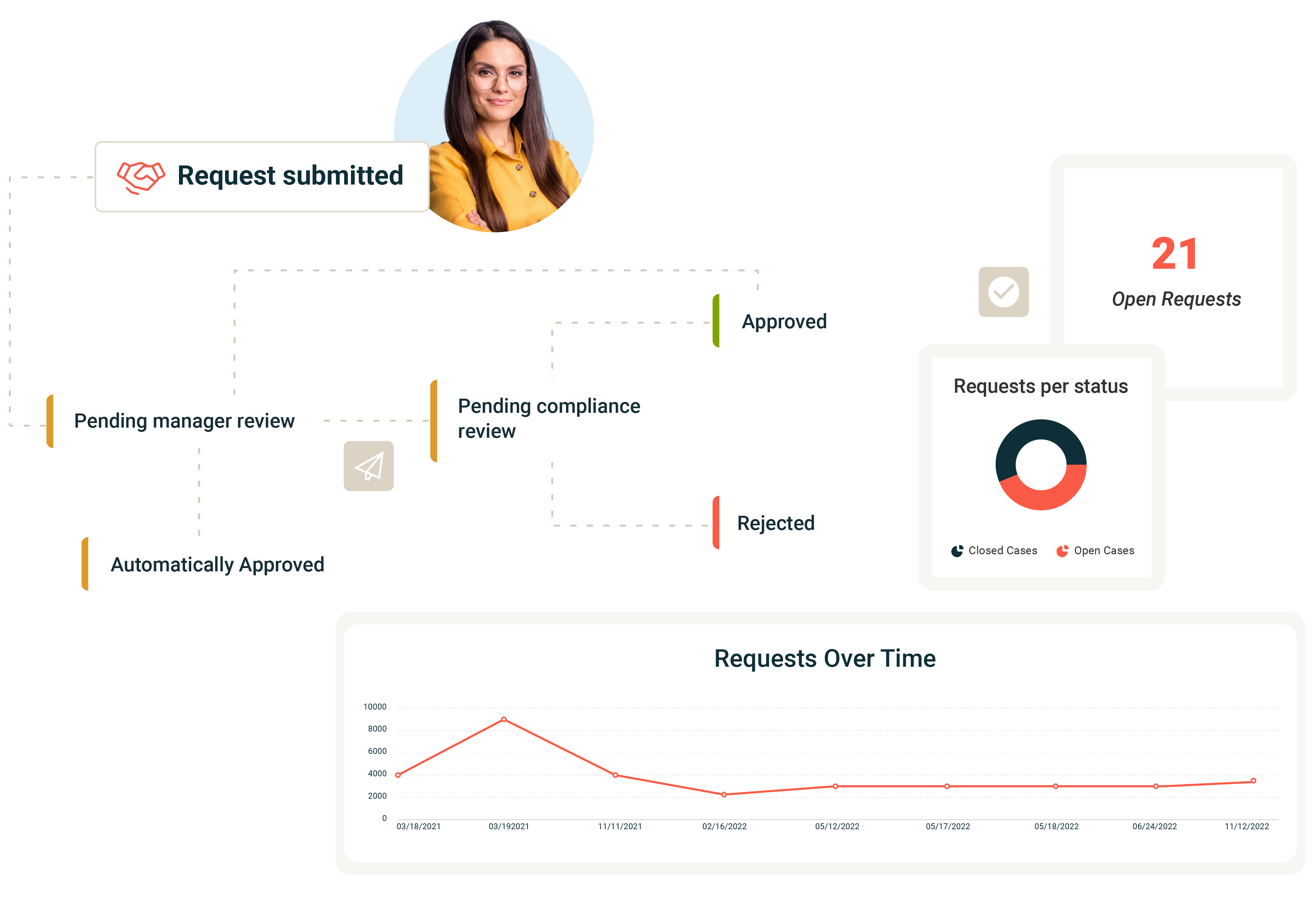
Reporting and Documentation
See everything across your compliance program, and generate reports and dashboards to demonstrate compliance program effectiveness to stakeholders and evidence to regulators. Capabilities include:
- Reporting and analytics: Executive, role-based dashboards to review the effectiveness of your compliance program initiatives.
- Evidence-based compliance: Maintain an auditable trail of all activity with the platform’s integrated and automated audit log.
- Compliance insights: See risk trends and patterns within your program, including third-party and supply chain risk, policies and disclosures.
